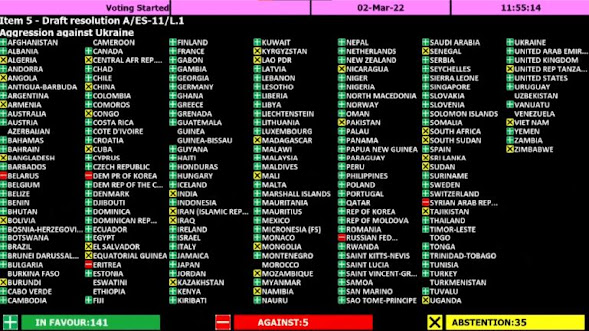Why Aren't We Even Talking About The UN Option?
As social and mainstream media go into overdrive with ever more frenzied speculation about how the Ukraine crisis might best be resolved – or even just what could be sensibly done to help – there is one conspicuous absentee from the parameters of the discussion: the United Nations. Almost all the talk focusses on what response ‘the West’ or NATO might make, and under what circumstances, and yet to the extent that this would bring regional actors into conflict with a nuclear-armed Russia, there's an understandable hesitance to press the case. And rightly so: neither the West nor NATO has any more right to take matters into their own hands than Russia does in invading Ukraine.
That's important, because if we want to avoid escalating this into a full-scale war, we need to be clear about the rationale for making any intervention. Though a case can certainly be made that both the US and the UK have a responsibility to defend Ukraine under the terms of the Budapest Memorandum (a responsibility they have been frantically back-pedalling from) the only sure ground we have to stand on is the fact that Russia is in clear breach of the UN Charter. This document is so little mentioned these days that it’s easy to forget what it says, but the key commitment – found in the opening sentence of Article 1.1 – states that the primary purpose of the UN is “To maintain international peace and security, and to that end: to take effective collective measures for the prevention and removal of threats to the peace.”
That’s pretty clear, as is the rest of the document (see https://www.un.org/en/about-us/un-charter/full-text) which includes the provision that the UN “may take such action by air, sea, or land forces as may be necessary to maintain or restore international peace and security.” And of course, that’s easier said than done. Since United Nations Charter was signed in 1945, the UN has failed to stop over 200 wars and conflicts in which over 20 million people have died. That’s hardly a good track record. And we all know why: the five ‘permanent members’ of the Security Council – the US, China, Russia, the UK and France – all have the power to veto any decisions they don’t like. It’s almost as if it were set up to fail. Except that it wasn’t – and it isn’t destined to. We just need to show a bit of bottle.
Because in fact, there's actually an effective workaround for the veto – as the UN itself showed on March 2nd in a rare display of determination. For the first time in 30 years, the little-known ‘Uniting for Peace’ Resolution 377 was used to bypass a Russian veto at the Security Council – and a resolution condemning Russia’s invasion of Ukraine was proposed and voted on at an Emergency Session of the UN General Assembly, where it passed with an overwhelming majority of 73%. This same resolution calls on Russia to both “immediately cease its use of force against Ukraine” and “immediately, completely and unconditionally withdraw all of its military forces”.
It’s unlikely to do so just because it’s been asked, however. Yet if enforcing compliance is going to involve open military conflict with Russia (if only through the imposition of a no-fly zone), how much better to do so in the name of the UN – as was done to bring the Suez Crisis to an end in 1956 – than for NATO or the US to go it alone. The latter would only inflame the ancient enmity between rival powers that lies at the very root of this whole problem. But action taken by and for the United Nations, in the name of the whole world, would give it the character of an international police action – the enforcement of a law that we all, including Russia and China, have signed up to.
It might also help counter the poisonous narrative being propagated within Russia, that this conflict has been fomented by its old Cold War enemy in the guise of NATO – and perhaps ease the path to the only way in which this issue can ultimately be solved, the removal of Putin from office and the dismantling of his brutal, authoritarian regime. So let us start talking about the UN option. Just as Martin Luther King based his Civil Rights movement on an appeal to rights already enshrined in the US Constitution, the cheque we need to cash right now is our commitment under the UN Charter – a commitment jointly made right after the last great act of aggression that engulfed the world.
Either that, or admit to ourselves that the bank of international justice has finally gone bankrupt...





Comments
Post a Comment